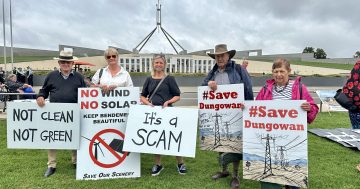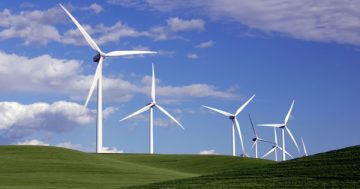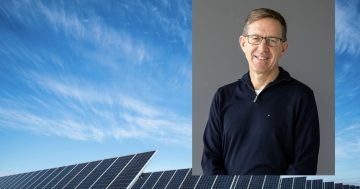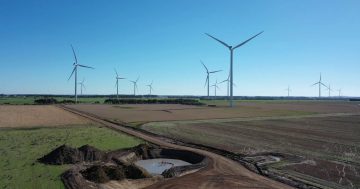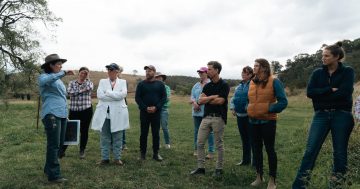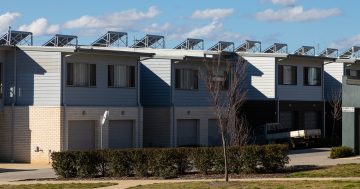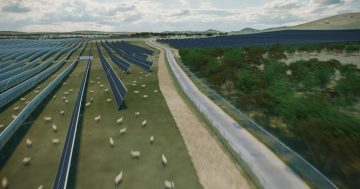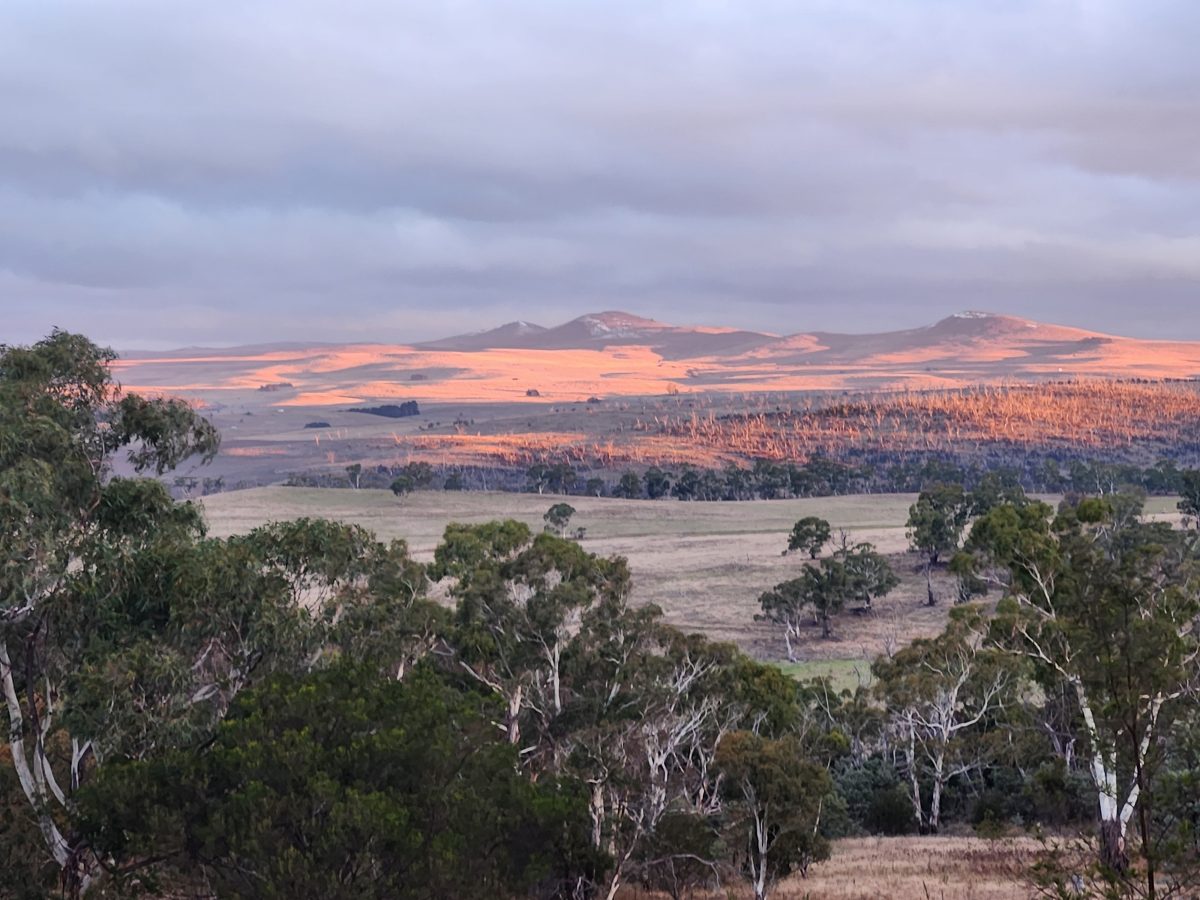
Landowners and residents protesting the proposed Coonerang Wind Farm development, which will take in the area’s landmark Brothers Hills (Gugang) near Cooma, will join protesters in Canberra tomorrow. Photo: Real Monaro.
Scores of farmers, landowners, conservationists and residents from across southern NSW are expected to join their national counterparts tomorrow (6 February) in a massive rally protesting regional renewable energy developments.
The National Rally Against Reckless Renewables has been planned to coincide with the first sitting day of Parliament, starting at 9:45 am on the lawns in front of Parliament House.
In the planning since late December, the rally is geared to represent regional communities directly and adversely affected by what organisers say is the Australian Government’s “reckless rollout of renewables”.
This coalition of grassroots community groups has united under the National Rational Energy Network (NREN) and its chair, Coolah farmer Grant Piper, in urging the federal and state governments to cease what they consider to be a hasty “rollout of unreliable, unaffordable, and environmentally destructive wind, solar, limited ‘firming’ batteries, and high-voltage transmission lines, amidst an ever-increasing demand for reliable electricity”.
With over 1000 new renewable projects in the government’s Department of Climate Change, Energy, the Environment and Water (DCCEEW) Rewiring the Nation pipeline, Mr Piper says almost all of these are located in regional Australia.
“Our concerns sit, firstly, around short, insincere, and unacknowledged community consultation exploiting the fact most of these projects are located in or near coastal, farming, and traditional communities with small populations,” Mr Piper said.
“The government continues to disregard our concerns,” he said, and in most cases, he asserts, their right to judicial review or appeal has or will be removed.
While acknowledging Australian consumers, taxpayers, and industries require an efficient, safe, reliable, secure, and affordable electricity network, Mr Piper said it shouldn’t be at the cost of productive agricultural land, fisheries and native habitats.
“This poses a significant threat to our nation, threatening food production for Australians and 80 million consumers globally.
“Our fauna and flora are facing unprecedented destruction, as hundreds of thousands of hectares of land and ocean floors are being deforested and/or damaged.”
He says renewables pose a threat to the economy to the tune of over $121 billion.
“There are documented serious supply chain and sustainment issues, and therefore reliability risks, potentially leading to mass blackouts,” he said.
Massive taxpayer subsidies and electricity bills will flow offshore for decades to the many “greenwashed” multinationals lined up for these subsidised “investments”, Mr Piper added.
Speakers at Tuesday’s rally – which is expected to run through until 3:30 pm – include Boorowa farmer Sam McGuiness and a raft of politicians, including the Nationals’ Barnaby Joyce, Ross Cadell and Matt Canavan, One Nation’s Pauline Hanson and Malcolm Roberts; Ralph Babet and former MP Craig Kelly of the United Australia Party, Bob Katter Liberal and senators Jacinta Nampijinpa Price and Gerard Rennick.
Attendees will call on the Australian Government to conduct a senate inquiry to scrutinise the technical veracity and economic, social and environmental costs of “renewables” and their possible impact on our national interest and security.
They’re also demanding the Council of Australian Governments (COAG) Energy Council suspend wind, solar, hydro and associated transmission construction until the above Senate inquiry reports.
Senator Matt Canavan said a bombshell government report stated nine in 10 people in the bush were unhappy with how wind and solar developments are treating them.
“We need to stop overseas-funded wind and solar factories destroying our land and our farming communities,” he said.
Not so, says Crookwell farmer Charlie Prell, who brought together Farmers for Climate Action (FCA) supporters for a press conference in Canberra on Sunday.
He said his farm hadn’t been making money during the drought – then a wind company came along.
“Our family farm wasn’t financially sustainable during the drought until we hosted wind turbines,” he said.
“Now the farm has substantial, bankable income locked in every year whether it rains or not and now we’re selling, the real estate agent says the secure income from renewable energy is driving my sale price up by hundreds of thousands of dollars.
“Renewables saved my family farm,” Mr Prell said.
FCA maintains that renewable energy makes farmers money, with recent polling showing widespread support for renewables in the regions.
Regional polling of 687 residents across Central Queensland, the Hunter and Illawarra found regional Australians believed the biggest threats to farming in their local regions were increased fires and floods driven by climate change (39.2%), commercial conduct by big supermarket chains (18.7%) and increasing cost of insurance and fertiliser and other inputs (17.5%).
Just 5.3 per cent nominated the construction of transmission lines on farmland and 7.6 per cent said renewable energy projects.
Regional people believe tourism (28.9%) to be the biggest opportunity for their local regions in the next 20 years, followed by renewable energy (21.6%) and healthcare employment (15.8%)
This follows a similar FCA survey of 518 farmers in December through National Farmers Federation (NFF) social media channels, which found only 1 per cent of farmers saw transmission as the greatest threat to their farm and only 0.6 per cent saw renewables as a threat.
More than 55 per cent of farmers nominated climate change as the greatest threat to their farm, with 14.8 per cent choosing bureaucracy and paperwork and 8.6 per cent nominating water availability.
Farmers for Climate Action chair Brett Hall said farmers making good money from renewables projects weren’t hard to find.
“Income during drought is vital when you’re trying to run a family farm and renewable energy delivers that,” he said.
Mr Hall said typical payments offered to farmers by wind companies were now more than $40,000 per turbine per year, and many farms host dozens of turbines while still farming sheep or cattle.
“Solar companies are now offering farmers around $1500 per hectare per year rent, and the farmer often continues to run sheep under the panels,” he added.
“Strong competition between renewable energy companies means farmers are choosing the best deal for them and their community,” Mr Hall said.
Original Article published by Edwina Mason on About Regional.












